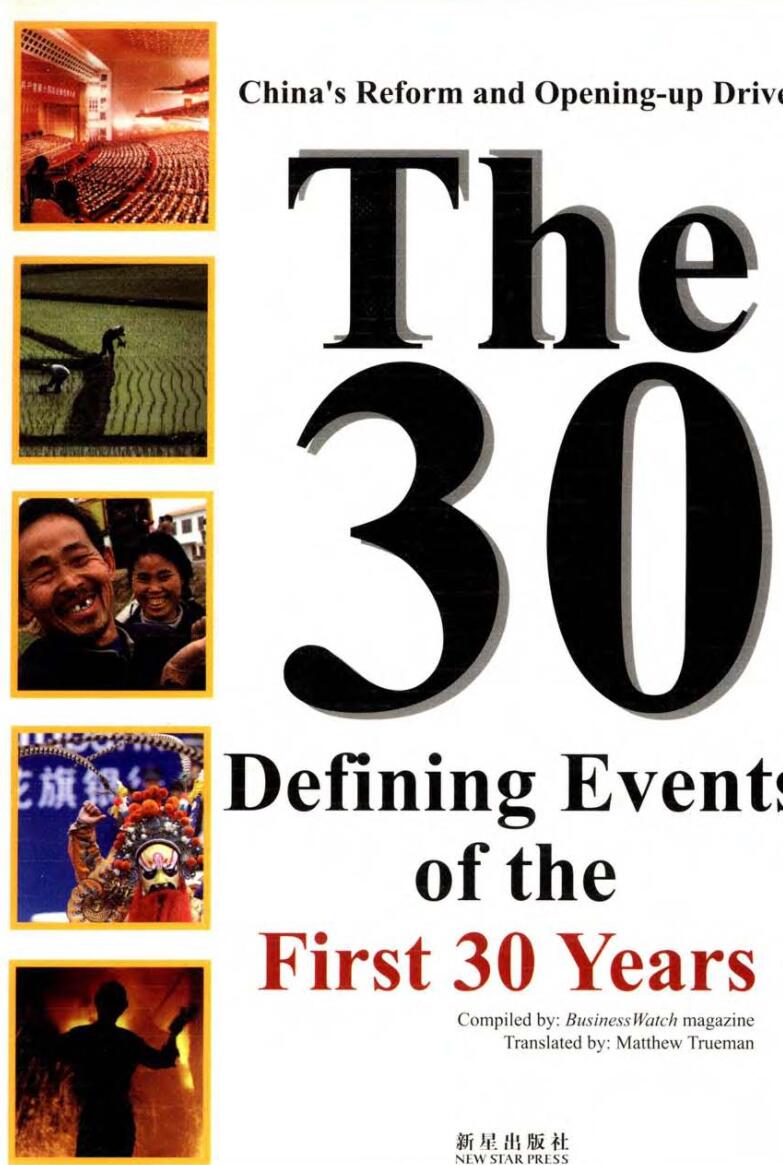改革开放30年最具影响力的30件经济大事-《商务周刊》杂志.epub|pdf|百度网盘下载

From December 18 to 22,1978,the Third Plenary Session of the 11th Central Committee of the Communist Party of China(C C C P C)was held in Beijing. This plenum is regarded as the start-ing point of China's"reform and opening-up."The key outcomes of this session were a shift in the Party's work focus towards modernization, and strengthening of the leadership to execute this strategic decision.During the session, the ideological line of"eman-cipating the mind and seeking truth from facts"was also reaffirmed.
The communique of the Third Plenary Session of the 11th C C C P C placed special emphasis on the importance of economic construction, stating:"We must set out to rectify the erroneoustendency of being overanxious for success, and the entire Party must pay attention to resolving the severe proportionate imbal-ance in the national economy. We must adopt a series of new and important measures to adjust the proportions of the national economy, which have fallen into imbalance;and embark on dili-gently reforming the system of economic management to address its over-concentration of power.O n the basis of self-reliance, we must actively develop equal and mutually beneficial economic cooperation with countries around the world;endeavor to adopt the world's advanced technology and equipment;and vigorously strengthen work in science and education that is needed to achieve modernization.These ideologies are the basis upon which the Com-munist Party of China(CPC)has established the important policy of opening up to the outside world and revitalizing the domestic economy."
The above excerpt was the original declaration of the guiding principle known as"one central task and two basic points.""Onecentral task"refers to the task of focusing efforts on"developing the productive forces";the"two basic points"refer to reform and opening-up.
No significant leadership changes were made at the Third Ple-nary Session of the 11th C C C P C. Although the then 74-year-old Deng Xiaoping was only the third highest ranking leader of the C P C in 1977,he had already gained the support of the majority of people both inside and outside the Party.Furthermore, among Chinese statesmen, only the seemingly undefeatable Deng(who had survived"three ups
and three downs"during his political career)was not only unrivaled in terms of experience but also boasted the full range of leadership skills—in Party, administrative and army roles as well as economic construction.A t the plenum, Deng's thinking and decision-making, for the first time, played a central and vital role—and had a decisive effect on the historical transfor-mation of Party policy.
Between October 1949 and the convocation of the Third Ple-nary Session of the 11th C C C P C in December 1978,the Party convened a total of 25 Central Committee plenums. The reason that this particular plenary session was so significant and received so much attention is that it marked a great turning point in the contemporary history of China.
The profound historic significance of this turning point is twofold. First, the plenum witnessed the generational succes-sion of the Party's top leadership, and the dawn of the Deng Xiaoping era.Second, the strategic decision was made at the ple-num to shift the Party's work focus and the public's attention to the socialist modernization drive.
The Third Plenary Session of the 11th C C C P C was, in fact, the second critical turning point in the Party's history. The first such turning point was an enlarged session of the Political Bu-reau of the C C C P C convened in Zunyi City, Guizhou in Janu-ary 1935;at the session, Mao Zedong's role as leader of the C P C was established, giving rise to the first generation of Party leader-ship(headed by Mao).The second such turning point, as mentioned, was the Third Plenary Session of the 11th C C C P C, convened in Beijing in December 1978;it was at this plenum that Deng Xiaoping's role as Party leader was confirmed, spawn-ing the second generation of C P C leadership(with Deng at its core).
Indeed, the historic significance of the T h i r d Plenary Session of the 11th C C C P C may be even greater when viewed across China's entire modern history. In this historical sense, the ple-num symbolized the rejuvenation of the Chinese nation:the end of China's move-ment(that began in 1840)to"save itself from extinction,"and the dawn of its landmark mission to become a strong and prosperous nation.
O n March 16,2007,Enterprise Income Tax Law of the People's Republic of China(Draft)was voted through at the Fifth Session of the 10th National People's Congress(NPC, China's top legislature). O n March 19,Chinese president H u Jintao signed"Presidential Order N o.63,"formally promulgating Enterprise Income Tax Law of the People's Republic of China(hereafter Enterprise Income Tax Law).W i t h the resultant unification of income tax laws for domestic-
and foreign-funded enterprises, the era of"super-national treatment"for FFEs reached its finale.
The new Enterprise Income Tax Law, which comprises eight chap-ters and 60 articles, took effect on January 1,2008. The law fol-lows c o m m o n international practices, embodying"f o u r unifications":unification of the enterprise income tax laws appli-cable to domestic-and foreign-funded enterprises;unification and appropriate reduction of enterprise income tax rates;unification and standardization of pre-tax deduction methods and standards;and unification of preferential tax policies.
The new Enterprise Income Tax Law stipulates that enterprises and other income-earning organizations inside the territory of C h i n a are liable to pay business income taxes. The law estab-lishes a unified tax rate of 25 percent for both domestic-and foreign-funded enterprises, eight percentage points lower than the original rate.In this way, the new tax law resolves the issues of different tax treatment for domestic and foreign enterprises and the large discrepancy between their respective tax burdens.In addition, since the newly adjusted tax rate of 25 percent is lower than the average global rate as well as those of neighboring countries, it still remains an attractive incentive to foreign enterprises.
Previously, China had practised a"double-track system"of en-terprise income taxation. Under this system, foreign-funded en-terprises were subject to the Income Tax Law of the People's Republic of China for Enterprises with Foreign Investment and Foreign Enterprises, passed at the Fourth Session of the Seventh N P C in 1991;while domestic-funded enterprises were governed by the Provisional Regu-lations of the People's Republic of China on Enterprise Income Tax, is-sued by the State Council in 1993.Although the nominal in-come tax rate for both domestic-and foreign-funded enterprises was 33 percent, in practice the actual average tax burden of do-mestic-funded enterprises was about 25 percent, while that of for-eign-funded enterprises was only around 15 percent.For over 20 years after China opened up to the outside world, this"super-national treatment"granted to foreign-funded enterprises attracted large amounts of foreign direct investment, helped China to solve its employment problem, and played an important role in enabling China to rapidly upgrade its manufacturing capabilities and management skills.A t the same time, however, it re-sulted in domestic enterprises being placed in a disadvan-tageous position i n competing with foreign-funded enterprises.This inequity prompted growing calls for the unification of China's two sets of enterprise income tax laws, especially after China's accession to the World Trade Organization(WTO).
链接: https://pan.baidu.com/s/1k01Cp_h36kIrpPfR9cjTZg
相关文章
- 《中国往事30年》(epub+azw3+mobi+pdf)|百度网盘下载
- 影响力 教材版 原书第5版(epub+azw3+mobi+pdf)|百度网盘下载
- 《特工训练手册:危急时刻如何绝处逢生》(epub+azw3+mobi+pdf)|百度网盘下载
- 《避暑》-azw3+epub+mobi电子书下载|百度网盘
- 《植物的欲望》(txt+pdf+epub+mobi电子书下载)|百度网盘下载
- 《先进 PID 控制 MATLAB 仿真》(第 3 版)(txt+pdf+epub+mobi电子书下载)|百度网盘下载
- 《网络工程与综合布线实用教程》(txt+pdf+epub+mobi电子书下载)|百度网盘下载
- 《比较文学与世界文学名家讲堂》(txt+pdf+epub+mobi电子书下载)|百度网盘下载
- 《形式语用学导论》高清PDF文字版本|百度网盘下载
- 《现代汉语虚词研究与对外汉语教学》(第二辑)高清PDF文字版本|百度网盘下载

